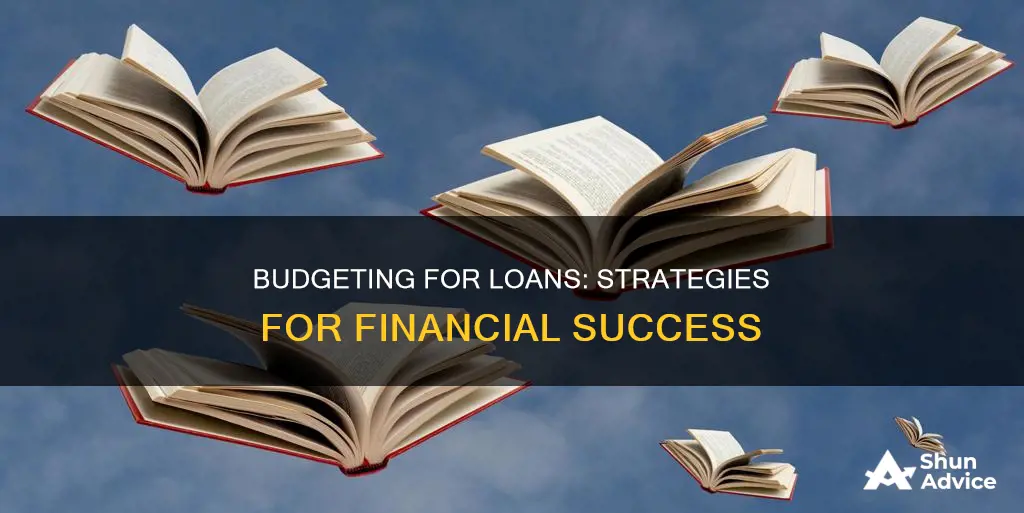
Budgeting loans are interest-free loans from the Department for Work and Pensions (DWP) that you can apply for if you are on a low income and receiving certain benefits. They are meant to cover essential expenses such as work uniforms, travel costs, or home repairs. Budgeting advances are similar but are specifically for those claiming universal credit. Both types of loans need to be paid back, typically through deductions from monthly benefit payments.
| Characteristics | Values |
|---|---|
| Type of loan | Budgeting loan |
| Loan provider | Department for Work and Pensions (DWP) |
| Interest | None |
| Eligibility | People on low income and receiving certain benefits |
| Application method | Online or by post |
| Application decision time | 7 days (online) or 21 days (by post) |
| Loan amount | £100-£812 |
| Repayment method | Deductions from monthly benefit payments |
| Repayment period | 12 months |
What You'll Learn

Budgeting loans and advances
Eligibility
To be eligible for a budgeting loan, you must have been receiving one of the following benefits for at least the last six months:
- Income Support
- Income-based Jobseeker's Allowance
- Income-related Employment and Support Allowance
- Pension Credit
You won't be able to get a DWP budgeting loan if you're currently receiving Universal Credit. Instead, you can apply for a budgeting advance, which is specifically for those claiming Universal Credit. To be eligible for a budgeting advance, you must have earned less than £2,600 (£3,600 if you're in a couple) in the past six months and not already be paying off another budgeting advance.
Application Process
You can apply for a budgeting loan or advance online or by post, but you'll get a faster decision if you apply online. The application form will ask you to specify the amount you want to borrow and the reason you want it. You'll also need to provide information about the benefits you receive, your regular expenses, and your savings.
Repayments
Repayments for budgeting loans and advances are typically taken automatically from future benefit payments. The amount repaid will be worked out when you take out the loan, and you will usually have up to two years to pay it back. If you are receiving Universal Credit, repayments for a budgeting advance will be taken from your monthly payments, and you will need to pay it back within 12 months.
How Bonuses Affect Loan Eligibility and Income Assessment
You may want to see also

Who is eligible?
Budgeting loans are available for people on low incomes who receive certain benefits. These benefits must have been received for at least the last six months. The benefits include income support, pension credit, and universal credit. If you have recently switched to receiving pension credit from universal credit, the length of time you received universal credit can be counted towards the six-month period required to qualify for a budgeting loan.
You won't be able to get a budgeting loan if you're currently only receiving universal credit. It is a budgeting advance that you need to be looking at instead. You also won't qualify for a budgeting loan or a budgeting advance if you already have budgeting or crisis loans on which you owe over £1,500 overall.
Budgeting advances are prioritised for people who need the money to get a new job or hold on to their current job, such as to cover the cost of tools. You are only allowed one budgeting advance at a time and need to have paid off any previous advances before you're eligible to apply for another.
Budgeting loans and advances are repaid through deductions from your monthly benefit payments. The amount you can borrow varies, usually between £100 and £812, depending on your circumstances. Your personal loan amount will depend on factors like the size of your family, whether you're repaying other loans, and your ability to repay.
Mudra Loan Subsidy: What Borrowers Need to Know
You may want to see also

How to apply
Budgeting loans are interest-free loans from the Department for Work and Pensions (DWP) that you can apply for if you are on a low income and receiving certain benefits. They are meant to cover essential expenses that you are unable to afford upfront, such as replacing a broken washing machine, buying a uniform for a new job, or dealing with funeral expenses.
Check Your Eligibility
To be eligible for a budgeting loan, you need to have been receiving certain means-tested benefits for at least the last six months. These benefits include income support, pension credit, and universal credit. It's important to note that if you are currently receiving universal credit, you will need to apply for a budgeting advance instead, which has a shorter repayment period.
Choose Your Application Method
You can apply for a budgeting loan online or by post. Applying online will result in a faster decision, usually within seven days if you opt for email or text communication. The paper application form can be obtained by calling the Social Fund or downloading it online. If you live in Northern Ireland, there is a separate form, phone number, and postal address for applying.
Fill Out the Application Form
The application form will ask you to specify the loan amount you require and the reason for your application. Be prepared to provide detailed information about the benefits you receive, your regular expenses, and your savings.
Await the Decision
If you applied online, you can expect a decision within seven days via email or text, or within 21 days if you chose to receive the decision by post. For postal applications, you will receive a decision letter within 21 days.
Accept the Loan
If your application is approved, you will receive the funds within seven days of accepting an online decision or within 21 days of accepting a postal decision.
Please note that budgeting loans do need to be repaid, usually through automatic deductions from your monthly benefit payments. The repayment period for budgeting loans is longer than for budgeting advances.
Mshda's 203(k) Loan Permission: A Guide to Renovation Loans
You may want to see also

Repayment methods
Budgeting loans and advances are interest-free loans from the Department for Work and Pensions (DWP) that you can apply for if you are on a low income and receiving certain benefits. They are meant to cover essential expenses that you are unable to pay for upfront, such as replacing a broken washing machine, buying a uniform for a new job, or dealing with funeral expenses.
Budgeting loans are typically repaid through an automatic reduction in the amount of benefits you receive. For those claiming universal credit, it is referred to as a budgeting advance, which is repaid through deductions from your monthly universal credit payments. The first deduction is made from the first payment you receive after taking the advance, and you must repay the advance within 12 months.
If you switch to another benefit while still making repayments, your payment will usually be reduced by the relevant amount until you have paid off the advance. If you stop receiving benefits altogether, the DWP Debt Management Contact Centre will inform you of the amount you owe, and you can then arrange how you will pay off the advance. If you do not, the DWP may ask your employer to make automatic deductions from your earnings or engage a debt collection agency.
It is important to note that budgeting loans and advances are separate from universal credit advance payments, which can cover the five-week wait for the first monthly universal credit payment.
Michigan's Dual Loan Policy: Is It Allowed?
You may want to see also

Interest rates
While budgeting loans from the DWP are interest-free, other loans from different sources may have varying interest rates. It is important to be cautious when considering loans with exceptionally high-interest rates, as these can lead to significant financial strain. For example, certain credit card debts, personal loans, payday loans, title loans, and rent-to-own payment plans often carry high-interest rates, resulting in borrowers repaying two or even three times the original amount borrowed.
Furthermore, it is worth noting that interest rates can vary based on the type of loan and the borrower's circumstances. For instance, loans for individuals with disabilities or long-term illnesses may have different interest rates compared to standard personal loans. It is always advisable to carefully review the terms and conditions of any loan agreement before committing, ensuring a clear understanding of the associated interest rate and repayment schedule.
Gold Loan Impact: CIBIL Scores and Muthoot Finance
You may want to see also
Frequently asked questions
A budgeting loan is a loan from the Department for Work and Pensions (DWP) that you can apply for if you receive certain means-tested benefits and need to cover an essential expense.
The amount you can borrow varies, usually between £100 and £812, depending on your circumstances. Your personal loan amount will depend on things like the size of your family, whether you’re repaying other DWP loans, and your ability to repay.
You can apply for a budgeting loan online or by post, but you’ll get a faster decision if you apply online. The application form asks you to specify the amount you want and the reason you want it. You’ll get a decision on an online application within seven days if you choose to be contacted by email or text, or 21 days if you opt for a postal decision.
Budgeting loans don’t charge interest and will typically be repaid through an automatic reduction in the amount of benefits you receive.







